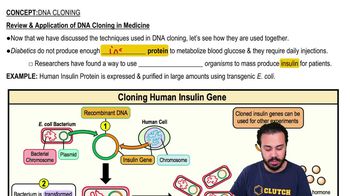Explain the role in nutrition of each of the following structures: bird crop, cow rumen, and elephant cecum.
Explain why insulin injections are more effective in controlling the blood glucose level in individuals with type 1 diabetes mellitus than in those with type 2 diabetes.
 Verified step by step guidance
Verified step by step guidance
Verified video answer for a similar problem:
Key Concepts
Type 1 Diabetes Mellitus

Type 2 Diabetes Mellitus

Insulin Therapy

Why is oral rehydration therapy with a solution of sodium chloride and glucose an effective treatment for dehydration? a. The sodium and glucose decrease urine output. b. The sodium and glucose facilitate water absorption by the small intestine. c. The sodium and glucose help kill intestinal bacteria. d. The sodium and glucose make the person thirsty.
Why is it important that the small intestine has a much greater surface area than the stomach or esophagus?
When food is plentiful, animals tend to store most of what they eat as fat. Why is this?
Among vertebrates, the large intestine exists only in lineages that are primarily terrestrial (amphibians, reptiles, and mammals). Propose a hypothesis to explain this observation.
Minnows are mainly carnivorous, eating insects and other small animals. However, herbivory has evolved independently in minnows several times. What changes in digestive structure and function are associated with the evolution of herbivory? Like cichlids, minnows use their pharyngeal jaws to process food. Suggest some possible structural differences between the teeth on the pharyngeal jaws of carnivorous and herbivorous minnows.
